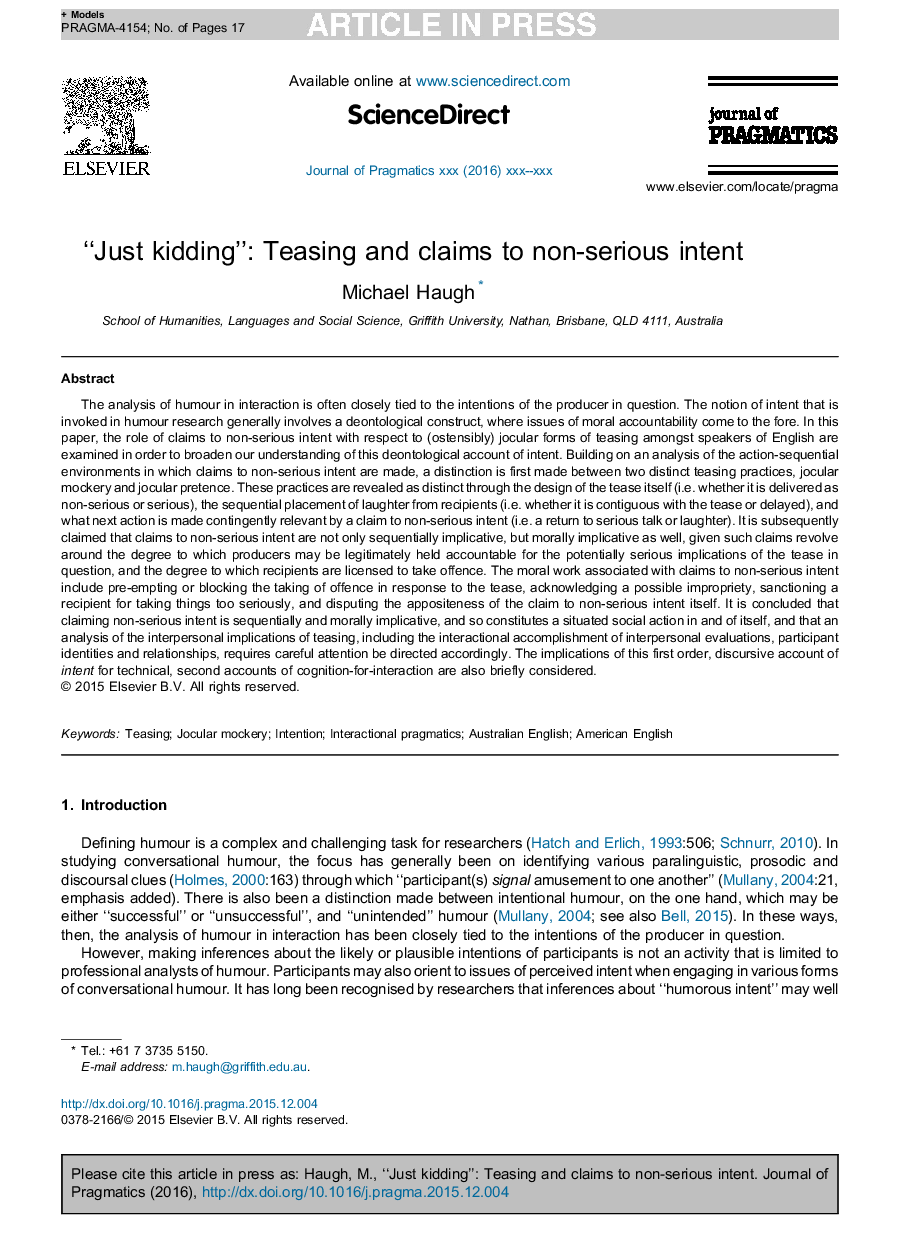| کد مقاله | کد نشریه | سال انتشار | مقاله انگلیسی | نسخه تمام متن |
|---|---|---|---|---|
| 7297939 | 1474705 | 2016 | 17 صفحه PDF | دانلود رایگان |
عنوان انگلیسی مقاله ISI
“Just kidding”: Teasing and claims to non-serious intent
ترجمه فارسی عنوان
فقط چیچینگ؟: اذیت کردن و ادعا کردن به قصد غیر جدی
دانلود مقاله + سفارش ترجمه
دانلود مقاله ISI انگلیسی
رایگان برای ایرانیان
کلمات کلیدی
اذیت کردن، خشونت عجیب و غریب، قصد پراگماتیک تعاملی، انگلیسی استرالیائی انگلیسی آمریکایی،
ترجمه چکیده
تجزیه و تحلیل طنز در تعامل اغلب با اهداف تولید کننده مرتبط مطابقت دارد. مفهوم قصد که در تحقیقات طنز مطرح می شود عموما شامل یک ساختار ناهنجاری است که در آن مسائل مربوط به پاسخگویی اخلاقی به پیش می رود. در این مقاله، نقش ادعا به قصد غیر جدی با توجه به فرم (ظاهرا) شگفت انگیز اذیت کردن در میان سخنرانان انگلیسی به منظور گسترش درک ما از این گزارش افتراقی از قصد مورد بررسی قرار گرفته است. بر اساس تجزیه و تحلیل محیط عملیاتی که در آن ادعا می شود قصد غیر جدی ساخته شده است، ابتدا تمایز بین دو شیوه متمایز اذیت کردن، اذیت و آزار و اذیت و آزار و اذیت است. این شیوه ها به وضوح از طریق طراحی شخصیت منفرد (یعنی اینکه آیا آن را به عنوان غیر جدی یا جدی تحویل داده می شود) مشخص شده است، قرار دادن پیوسته خنده از گیرندگان (یعنی اینکه آیا با پیاده روی و یا به تعویق افتاده است) اقدام به صورت احتمالی توسط یک ادعا به قصد غیر جدی (یعنی بازگشت به بحث جدی یا خنده) مرتبط است. پس از آن ادعا می شود که ادعا می کند که قصد غیر جدی نه تنها به طور پیوسته پیوسته است، بلکه به لحاظ اخلاقی نیز، با توجه به این ادعاهایی، در مورد درجه ای است که تولیدکنندگان می توانند به طور قانونی برای پیامدهای بالقوه جدی واضح این موضوع پاسخگو باشند، و درجه ای که دریافت کنندگان مجاز به جرم هستند. کار اخلاقی مرتبط با ادعاهاری به قصد غیرسرخی شامل پیشگیری یا جلوگیری از اتهام جرم در واکنش به اذیت کردن، تصدیق یک ناسازگاری احتمالی، تصویب مجازات دریافت کننده برای انجام امور به صورت جدی و اختلاف در مورد ادعای ادعای غیر انسانی - قصد جدی خود. این نتیجه گیری می شود که ادعای قصد غیر جدی به صورت پیوسته و اخلاقی است و به همین جهت یک اقدام اجتماعی واقع در خود و خود را تشکیل می دهد و تجزیه و تحلیل مفاهیم بین فردی از اذیت کردن، از جمله انجام ارزیابی بین فردی، هویت ها و روابط شرکت کنندگان ، مستلزم توجه دقیق به نظر برسد. مفاهیم این نظم اول، حساب دیسوری از قصد برای حساب های فنی، شناخت برای تعامل نیز به طور خلاصه در نظر گرفته شده است.
موضوعات مرتبط
علوم انسانی و اجتماعی
علوم انسانی و هنر
زبان و زبان شناسی
چکیده انگلیسی
The analysis of humour in interaction is often closely tied to the intentions of the producer in question. The notion of intent that is invoked in humour research generally involves a deontological construct, where issues of moral accountability come to the fore. In this paper, the role of claims to non-serious intent with respect to (ostensibly) jocular forms of teasing amongst speakers of English are examined in order to broaden our understanding of this deontological account of intent. Building on an analysis of the action-sequential environments in which claims to non-serious intent are made, a distinction is first made between two distinct teasing practices, jocular mockery and jocular pretence. These practices are revealed as distinct through the design of the tease itself (i.e. whether it is delivered as non-serious or serious), the sequential placement of laughter from recipients (i.e. whether it is contiguous with the tease or delayed), and what next action is made contingently relevant by a claim to non-serious intent (i.e. a return to serious talk or laughter). It is subsequently claimed that claims to non-serious intent are not only sequentially implicative, but morally implicative as well, given such claims revolve around the degree to which producers may be legitimately held accountable for the potentially serious implications of the tease in question, and the degree to which recipients are licensed to take offence. The moral work associated with claims to non-serious intent include pre-empting or blocking the taking of offence in response to the tease, acknowledging a possible impropriety, sanctioning a recipient for taking things too seriously, and disputing the appositeness of the claim to non-serious intent itself. It is concluded that claiming non-serious intent is sequentially and morally implicative, and so constitutes a situated social action in and of itself, and that an analysis of the interpersonal implications of teasing, including the interactional accomplishment of interpersonal evaluations, participant identities and relationships, requires careful attention be directed accordingly. The implications of this first order, discursive account of intent for technical, second accounts of cognition-for-interaction are also briefly considered.
ناشر
Database: Elsevier - ScienceDirect (ساینس دایرکت)
Journal: Journal of Pragmatics - Volume 95, April 2016, Pages 120-136
Journal: Journal of Pragmatics - Volume 95, April 2016, Pages 120-136
نویسندگان
Michael Haugh,
